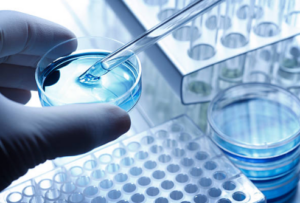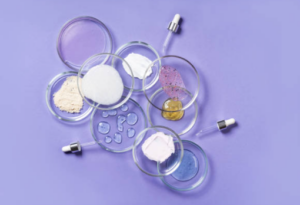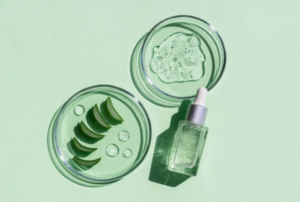Innovation, Ethics, and the Future

In the dynamic landscape of beauty, where science converges with aesthetics, a revolutionary wave is transforming the industry – the integration of biotechnology. As laboratories become the new beauty labs, and formulas evolve with the precision of genetic engineering, the intersection of biotechnology and beauty promises a future where skincare transcends conventional boundaries. In this comprehensive exploration, we delve into the realms of innovation, ethical considerations, and the vast potential that biotechnology holds for the future of beauty.
In recent years, biotechnology has transcended its traditional domains and entered the world of cosmetics. From advanced skincare formulations to personalized beauty experiences, the marriage of biology and technology is redefining the boundaries of beauty. Let’s embark on a journey through the intricacies of biotechnology in beauty, exploring the innovations that propel us into the future.
I. Biotechnology in Skincare
The marriage of biotechnology and skincare heralds a new era of precision, unlocking the intricate mechanisms of cellular biology to revolutionize the way we approach beauty. Here, we delve into the fascinating world of biotech skincare, where scientific innovation meets the quest for timeless, radiant skin.
- The Science Behind Biotech Skincare
Biotech skincare operates at the intersection of biology and technology, leveraging the latest scientific advancements to enhance the efficacy of skincare formulations. Laboratories teem with researchers exploring the molecular intricacies of skin cells, seeking to decipher the complex language of cellular communication for targeted and effective results.
In Practice: Biotech skincare formulations often feature advanced delivery systems that allow key ingredients to penetrate the skin at a cellular level. Liposomes, nanosomes, and other nanotechnologies enable precise delivery, ensuring that active compounds reach their intended destinations within the skin.
- DNA Repair
One of the groundbreaking applications of biotechnology in skincare revolves around DNA repair mechanisms. Our skin, constantly exposed to environmental stressors, undergoes DNA damage over time. Biotech skincare introduces enzymes and peptides designed to repair and restore damaged DNA, promoting cellular rejuvenation and contributing to the promise of ageless beauty.
In Practice: Enzymes like photolyases, inspired by the repair mechanisms found in certain plants and bacteria, work to reverse damage caused by UV radiation. Peptides, designed to mimic the structure of naturally occurring proteins, stimulate collagen synthesis and aid in overall skin repair.
- Stem Cell Technology
Stem cell technology, a hallmark of biotechnology, is a game-changer in skincare. Derived from plant sources or cultured human cells, stem cells possess remarkable regenerative properties. In skincare, these cells are harnessed to stimulate the skin’s natural renewal processes, contributing to improved texture, elasticity, and a more youthful appearance.
In Practice: Stem cell extracts from plants like apples, edelweiss, or grape vines are incorporated into skincare formulations. These extracts, rich in phytonutrients and antioxidants, provide a source of vitality to the skin, promoting cellular regeneration and resilience.

II. Ethical Considerations in Biotech Beauty
The fusion of biotechnology and beauty not only propels us into a realm of innovation but also raises critical ethical considerations. As we navigate this exciting landscape, it becomes imperative to strike a balance between scientific progress and ethical responsibility, ensuring that the beauty industry upholds moral standards in the pursuit of groundbreaking technologies.
The traditional beauty industry has long been criticized for animal testing, a practice that raises ethical concerns about animal welfare. In the context of biotechnology, a shift towards cruelty-free practices becomes not only desirable but a moral imperative. Ethical beauty brands are increasingly adopting in vitro testing methods, cell cultures, and computational models to ensure the safety and efficacy of biotech beauty products without subjecting animals to unnecessary suffering.
Biotechnology in beauty often involves the use of genetically modified organisms (GMOs) or the cultivation of specific cells for their beneficial properties. Ethical considerations come into play regarding the sourcing of these ingredients. Responsible sourcing involves ensuring that the cultivation and extraction processes adhere to ethical standards, avoiding practices that exploit communities or harm ecosystems.
Choosing beauty products from brands that prioritize ethical sourcing practices is a consumer-driven approach to supporting responsible biotech beauty. Brands that transparently communicate their commitment to ethical ingredient sourcing contribute to a more conscientious industry.
Transparency is a cornerstone of ethical considerations in biotech beauty. Consumers have the right to know what goes into the formulations they apply to their skin. Beauty brands that prioritize transparency not only build trust with their customers but also empower them to make informed choices about the products they use.

III. Personalized Beauty
- DNA Analysis for Personalized Skincare
Biotechnology has given rise to a groundbreaking approach to skincare customization — DNA analysis. By decoding the genetic information embedded within our DNA, beauty brands can now offer personalized skincare regimens designed to address specific concerns and optimize results based on an individual’s unique genetic makeup.
Consumers can participate in at-home DNA testing or visit specialized clinics to have their genetic makeup analyzed. The obtained data is then used to formulate skincare products tailored to the individual’s genetic predispositions, addressing issues such as sensitivity, hydration levels, and collagen production.
- Microbiome Mapping
Another facet of personalized beauty through biotechnology involves the mapping of the skin microbiome. The skin is home to a diverse community of microorganisms that play a crucial role in maintaining skin health. Biotech beauty utilizes advanced techniques, such as DNA sequencing, to identify the specific strains of bacteria residing on the skin’s surface.
Microbiome mapping services can be offered through skincare clinics or at-home kits. By understanding the unique composition of an individual’s skin microbiome, beauty formulations can be customized to support a healthy microbial balance, promoting resilience and preventing issues like inflammation or acne.
- AI-Driven Beauty Advisors
Artificial Intelligence (AI) is emerging as a key player in the realm of personalized beauty. Advanced algorithms analyze vast datasets, including genetic information, lifestyle factors, and skincare preferences, to provide personalized recommendations. AI-driven beauty advisors offer real-time guidance, adapting skincare routines based on environmental factors, hormonal changes, and emerging skincare trends.
Beauty brands are integrating AI-driven beauty advisors into their online platforms or dedicated apps. Users input data about their skin concerns, preferences, and genetic information, and the AI algorithm generates tailored recommendations for skincare routines, product selections, and lifestyle adjustments.
IV. Biotechnology in Haircare and Fragrance
Biotechnology is not confined to the skin; it’s making waves in the world of haircare. From gene editing for enhanced hair health to the development of biomimetic ingredients, biotech innovations promise a new era in hair rejuvenation and maintenance.
Researchers are exploring the genetic factors that influence hair health and appearance. Gene-editing technologies may eventually lead to personalized haircare solutions, targeting specific genetic markers to address concerns such as hair loss, brittleness, or lack of luster.
The fragrance industry is experiencing a revolution as biotechnology enables the synthesis of scent molecules with unprecedented precision. This not only enhances fragrance creation but also allows for sustainable practices in sourcing and production.
Biotech-driven fragrance creation involves the use of microbial fermentation to produce aromatic compounds. This sustainable approach reduces reliance on traditional botanical sources, ensuring a more eco-friendly and consistent supply of fragrance ingredients.
The rapid advancements in biotechnology have ushered in a new era for the beauty industry, bringing with it a host of regulatory challenges. Striking a delicate balance between fostering innovation and ensuring consumer safety is paramount. Collaborative efforts among scientists, regulatory bodies, and beauty brands are crucial to establishing and maintaining rigorous standards for biotech beauty products. This collaborative approach aims to create a regulatory framework that encourages groundbreaking advancements while safeguarding the well-being of consumers.
While the potential benefits of biotechnology in beauty are vast, addressing its environmental impact is of utmost importance. Sustainable practices must be at the forefront of the biotech beauty landscape to mitigate any adverse effects on the environment. This involves adopting ethical sourcing practices for biotechnologically derived ingredients and incorporating eco-friendly packaging solutions. By doing so, the beauty industry can take significant strides towards reducing its ecological footprint and contributing to a more sustainable future.

Standing at the crossroads of biotechnology and beauty, the future promises an exciting journey into uncharted territories. Innovations in biotech beauty are set to redefine industry norms, presenting boundless possibilities for consumers and brands alike. Anticipated breakthroughs may include revolutionary discoveries in anti-aging formulations, advancements in promoting skin health, and the development of products that contribute to overall well-being. As researchers delve deeper into the molecular intricacies of beauty, the synergy between biotechnology and cosmetics is likely to yield transformative outcomes, shaping the future of beauty in ways we have yet to imagine. The dynamic interplay between science and aesthetics opens doors to a new era where biotech beauty pioneers new frontiers for the industry.
In the grand narrative of beauty, biotechnology emerges as a protagonist, transforming the way we perceive and engage with skincare, haircare, and fragrance. From ethical considerations to personalized experiences and beyond, the fusion of biology and technology promises a future where beauty is not just skin-deep but intricately woven into the fabric of our genetic makeup. As we embark on this beauty biotech odyssey, we witness the unfolding chapters of innovation, ethics, and the limitless potential that propels us toward a beauty revolution unlike any other.

